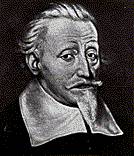Introduction
(born Bad Löstriz, baptized 9 October 1585; died Dresden, 6 November
1672).
In 1590 he moved with his family to Weissenfels. In 1598 Landgrave Moritz,
impressed by his musical accomplishments, took him to Kassel, where he
served as a choirboy and studied music with the court Kapellmeister, Georg
Otto. In 1609 Schütz proceeded to the University of Marburg to study
law, but Landgrave Moritz advised him to abandon his university studies
and to go to Venice as a pupil of G. Gabrieli; moreover, the landgrave
provided the financial means to do this. Schütz remained in Venice
for over three years, returning to Moritz's court at Kassel in 1613. The
following year he was seconded to serve for two months at the electoral
court in Dresden, and in 1615 the Elector Johann Georg I requested his
services for a further two years. Moritz reluctantly agreed, and was obliged,
for political reasons, to comply when the elector insisted on retaining
Schütz in his permanent employ.
As Kapellmeister at Dresden, Schütz was responsible for providing
music for major court ceremonies, whether religious or political. He also
had to keep the Kapelle adequately staffed and supervise the musical education
of the choirboys. His pupils during the following decades included the
composers Bernhard, Theile and Weckmann. In 1619 Schütz published
his first collection of sacred music, the Psalmen Davids, dedicated
to the elector, and later that year he married Magdalena Wildeck. She died
in 1625, leaving Schütz with two daughters whom he placed in the care
of their maternal grandmother; he never remarried.
Schütz was often absent from Dresden on his own or the elector's
business, and in 1627 he was at Torgau, where his Dafne (the first
German opera) was performed for the wedding of the elector's daughter Sophia
Eleonora. Visits to Mühlhausen and possibly Gera were undertaken later
in the year. Towards the end of the 1620s economic pressures of the Thirty
Years War began to affect the electoral court. Musicians' wages fell into
arrears, and in 1628 Schütz decided on a second visit to Venice, where
he was able to study developments in dramatic music under Monteverdi's
guidance. He returned to Dresden in 1629, but two years later Saxony entered
the war and musical activities at court soon came to a virtual halt. Schütz
then accepted an invitation to direct the music at the wedding of Crown
Prince Christian of Denmark. He arrived in Copenhagen in December 1633
and was paid a salary as Kapellmeister by King Christian IV until his return
to Dresden in May 1635.
From Michaelmas 1639 Schütz was again absent from Dresden, this
time for about 15 months in the service of Georg of Calenberg. On his retum
he found the Kapelle further depleted and its members living in penury,
and for most of 1642-4 he was again employed at the Danish court. After
a year in and around Brunswick he went into semi-retirement, spending much
of his time in Weissenfels, though he retained the title and responsibilities
of Kapellmeister at Dresden. The end of the Thirty Years War had little
immediate effect on musical conditions and in 1651 Schütz renewed
an earlier plea for release from his duties and the granting of a pension.
This and later petitions were ignored and Schütz obtained his release
only on the elector's death in 1656. He was far from inactive during his
remaining 15 years. He continued to supply music for occasions at Dresden,
frequently travelled and worked on the masterpieces of his last years -
the Christmas History, the three Passions and the settings of Psalms cxix
and c.
Schütz was the greatest German composer of the 17th century and
the first of international stature. His output was almost exclusively sacred;
he set mainly biblical texts and wrote little chorale-based music. His
early works explore a variety of styles and genres: the polychoral Psalmen
Davids (1619) are notable for their contrasting textures and sonorities,
while the Cantiones sacrae (1625) present a wide range of motet
settings, from the polyphonic to the concertato. Later, he exploited the
Italian concertato idiom to the full, notably in the three books of Symphoniae
sacrae (1629, 1647, 1650), which give equal weight to voices and instruments.
His two sets of Kleine geistliche Concerte (1636, 1639), written
after the Thirty Years War and for limited forces, emphasize the meaning
of the text, combining principles of monody and counterpoint to create
powerful and expressive declamation. Schütz's late works are dominated
by the oratorical pieces and by the three unaccompanied 'dramatic' Passions,
said to be the last great examples of the genre. His music, largely to
German texts, constitutes the ultimate realization of Luther's endeavours
to establish the vernacular as a literary and liturgical language, and
embodies the Protestant and humanistic concept of musica poetica
in perhaps its most perfect form.
Extracted with permission from
The Grove Concise Dictionary of Music
edited by Stanley Sadie
© Macmillan Press Ltd., London. |
Detailed Information about
-
Picture Gallery
-
List of Works
-
Bibliography
can be found on the internet on:
Classical Music Pages:  |
This project was created by Matt Boynick.
© 1 February 1996
Last Revision - 25 August 1999
|


